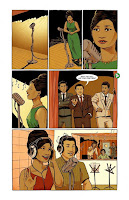Too often, the media and Twitter (X) users just shrug their shoulders at genocide, so we inevitably get more of it, like Hamas’s horrifying genocidal terrorist attacks still rocking Israel. It is time to face up to genocidal crimes and the ideologies that commit them, from the CCP’s systemic campaign against the Uyghurs to the Marxist Khmer Rouge, who decimated Cambodia’s artists and intellectuals. Sadly, the widely popular vocalist Ros Serey Sothea was one of them. Gregory Cahill tells her story in the graphic novel The Golden Voice: The Ballad of Cambodian Rock’s Lost Rock Queen, illustrated by Kat Baumann, which goes on-sale today.
You might know the basic facts of the singer’s life from the documentary, Don’t Think I’ve Forgotten: Cambodia’s Lost Rock & Roll. Many of the details are Cahill’s speculation, but reasonably based on the circumstances of Cambodian history. The “Golden Voice,” as she was dubbed, was nationally beloved, because she was a country girl who made good. However, that would not earn her much slack from the Khmer Rouge, especially given her tumultuous relationship with one of Lon Nol’s married officers.
Three quarters of the graphic novel covers events prior to the Khmer Rouge genocide. That might make it sound less depressing, but she still endured plenty of pain and struggle during her professional life. Regardless, the inevitable tragic end hangs over the entire narrative.
In fact, the ways Cahill fills in the gaps in Sothea’s life seem highly credible and well thought out. Conversely, his creation of two American “non-advising” military advisors read like mouthpieces for historical exposition and the writer’s opinion on American policy.
If anything, Cahill’s graphic novel under-emphasizes the extent to which the Khmer Rouge destroyed Cambodian culture. The only records of Ros Serey Sothea and her colleagues that survived were those imported to other countries. As Davy Chou documented in Golden Slumbers, from 1960 to1975, the Cambodian film industry produced about 450 films. Only thirty are thought to survive today. The loss is almost incalculable.
Regardless, keeping memories of Ros Serey Sothea alive is a worthy endeavor. Cahill skillfully walks a difficult line, humanizing her, without creating dubious controversies (at least from a non-Cambodian perspective). It is a respectful and sympathetic portrait readers can easily identify with. Recommended as a good introduction for younger readers to the artist and the Khmer Rouge’s crimes against humanity, The Golden Voice: The Ballad of Cambodian Rock’s Lost Rock Queen is now on-sale wherever books and comics are sold.

